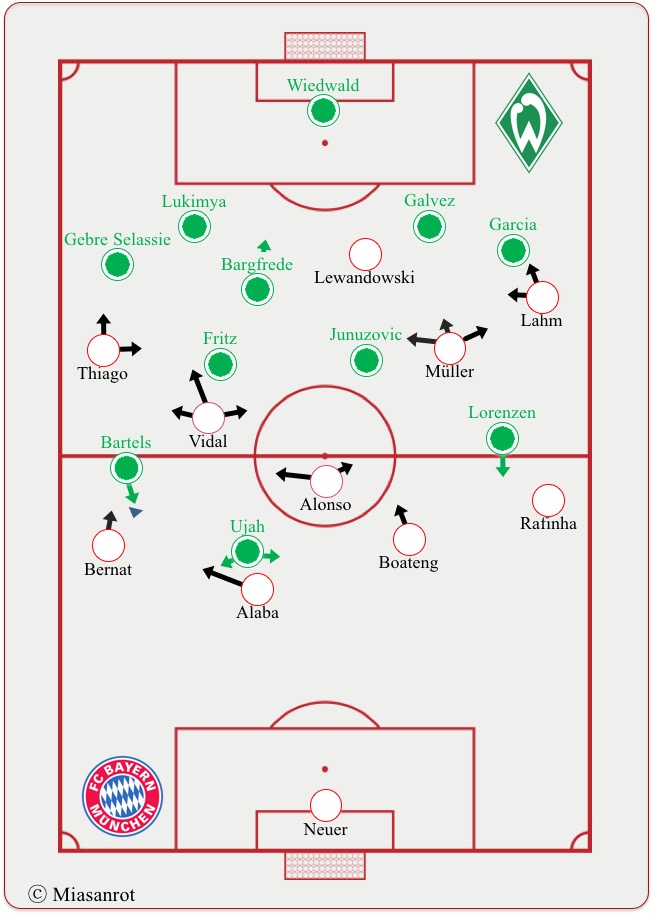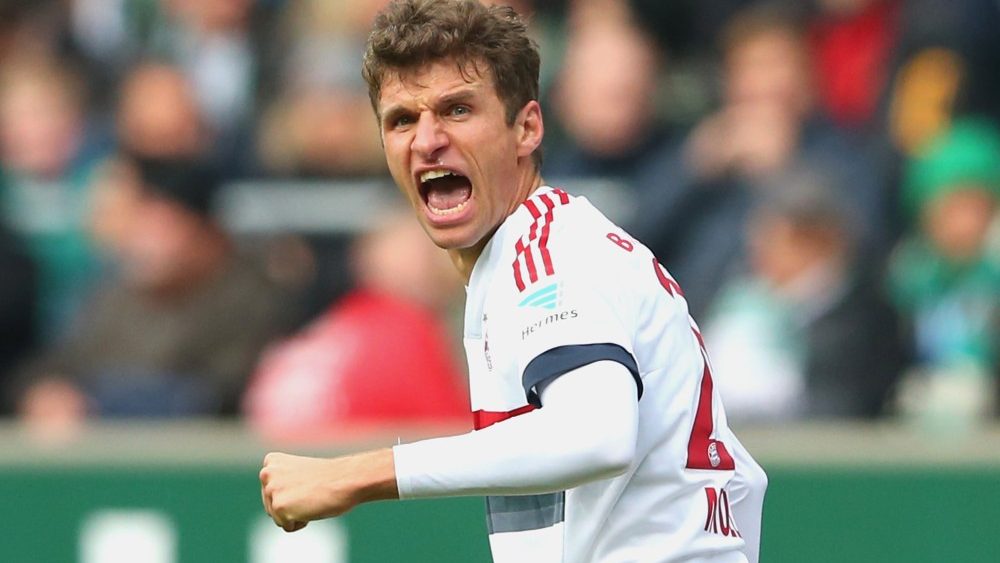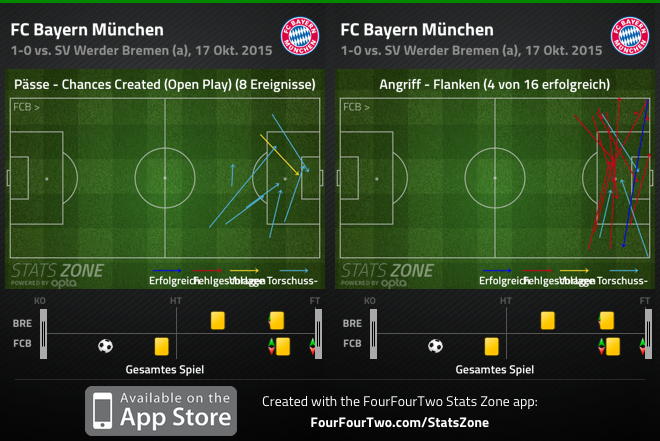Match Analysis: SV Werder Bremen – FC Bayern München 0-1 (0-1)
With an unbelievable run of 5 games with more than 4 goals, Bayern Munich had to play against Bremen. Over the last few years Bremen had become a preferred opponent of the Munich team. The last defeat stems from the Jürgen Klinsmann era, a 2 -5 defeat at home, with no other than Tim Borowski scoring for Bayern.
 Werder Bremen quickly shifted to a highly defensive setup with a back-five.
Werder Bremen quickly shifted to a highly defensive setup with a back-five.3 things we noticed:
1. Werder forces Bayern to play tiki – taka
Of course tiki-taka is a totally inadequate reduction of a pass-intensive basic orientation, which Bayern outgrew at the beginning of this season at the latest. Nevertheless on Saturday, the Green/White forced the Guardiola squad to a style which was a reminiscent of the beginning of the Guardiola era in Munich. Extremely high possession, a lot of game control, long passing relays and problems with going into the box. Sort of like the game against Real Madrid in the Champions League semis in 2014. Only with Bargfrede and Lorenzen instead of Modric and Ronaldo.
All that stemmed from an extremely organized and compact home team – and also from the missing dribbling strengths of the Munich offense. For the first time, they started without Douglas Costa and/or Arjen Robben in the starting line-up – which played into Werder’s hand.
The home team shut down the path into the box with up to nine players. Because Thiago, Bernat or Rafinha didn’t necessitate being doubled when attacking, Bremen could afford to put 5 or 6 players in the central area of the box. Bayern didn’t like that at all and they had more ball possession than they’ve had in a long time. In the end, Bayern played 200 short passes more than the average of this season (850). Despite the absurdly high ball possession, the Munich team only achieved 14 successful dribbles. On average, they have 16, despite significantly lower ball possession numbers. Thiago, who roamed to the left wing a lot, was the most successful dribbler (4). Yet even he didn’t manage to penetrate the box with the ball at his feet.
As a consequence it wasn’t surprising that 6 out of 8 chances were created by passes outside of the box. That is not really Bayern’s game. A lot of crosses did fall flat on Werder’s back line. The fact that Bayern nevertheless managed to create some good opportunities is because of good timing with crosses, as well as smart movement. Müller’s goal is the prime example.
Ultimately, the game showed once more how important an explosive forward player like Douglas Costa is for Bayern’s strengths. Not only because he creates chances by himself, but because he attracts the attention of the opposing defense.
2. Games after the international break
Games after the international break are always critical. Even more so if it is against a team with far fewer international players who can concentrate on the upcoming game. Aside from the injured Götze and Coman, both of them influencing the Bayern game in September, another factor is that players return from their national team at different times. FC Bayern was in a luxurious position with most players returning really early from international duty. But key players such as Costa and Vidal played at night on Tuesday and Wednesday, in terms of European time. Costa only returned to Munich on Friday. Planning with those players seemed, because of the time zone differences, to appear as a big risk for Guardiola, particularly with more important games coming up in the days ahead. The coach had, as already mentioned, to adjust his team.
That means games after the breaks are always associated with luck, similar to the international break at the beginning of September. The 2:1 win against Augsburg was arguably the worst performance of the season. A lot of players had problems picking up the pace again. Bayern and Pep Guardiola would be wise to devise a strategy for the upcoming break (between the 12th and 13th match day). The next match after the break will be in Gelsenkirchen on November 21.
3. It is a run
Nine games – nine wins. No goals allowed in the second half. 29:4 goals mean a difference of +25. We’re back to counting wins and records. The cheering of the players after the game showed that this match was really important. Not only because they set a new starting record but because the last win against Borussia Dortmund wasn’t in vain. What’s it worth to beat your direct competitor, if you lost on the next match day?
With this attitude the Munich squad celebrated their win against Bremen and start the fall season, with the fourth consecutive title on the line, once more full of expectations.
| WERDER BREMEN – FC BAYERN 0-1 (0-1) | |
|---|---|
| Werder Bremen | Wiedwald – Gebre Selassie, Lukimya, Galvez, S. Garcia – Bargfrede, Fritz (78. Pizarro), Junuzovic, Bartels – Lorenzen (59. Öztunali), Ujah |
| Subs | Zetterer – U. Garcia, Hüsing, Kroos, Sternberg |
| FC Bayern | Neuer – Rafinha (78. Kimmich), Boateng, Alaba, Bernat – Alonso – Lahm, Vidal (90. Pantovic), Müller, Thiago – Lewandowski |
| Subs | Ulreich – Martínez, Costa, Kirchhoff, Gaudino |
| Goals | 0-1 Müller (23.) |
| Cards | Yellow: Garcia, Bargfrede / Rafinha, Kimmich |
| Referee | Dingert (Lebecksmühle) |
| Attendance | 42.100 (sold out) |






